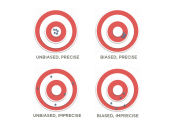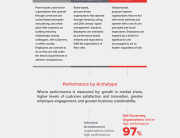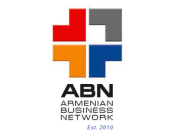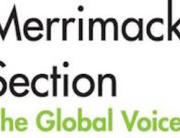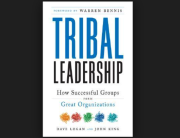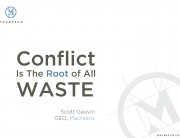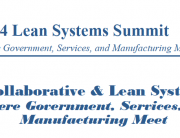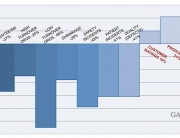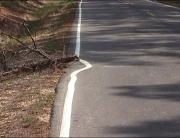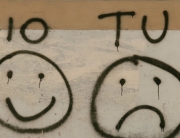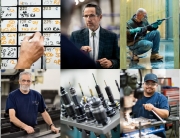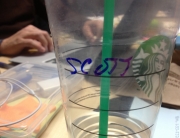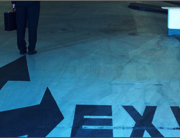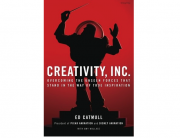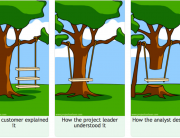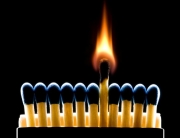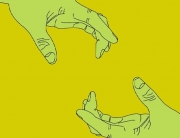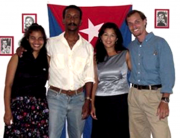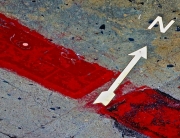Over the last 15 years of my lean journey, there are two themes that I repeatedly learn, respect, and waste elimination. Both of these concepts are foundational to the Toyota Production System. I was taught that TPS tools and principles exist to expose waste, so it can be eliminated. I was also taught that the execution of these tools must be done in a way that is respectful to people. The latter is more ambiguous but time continues to teach me.
I was taught that waste is the non-value add elements of our work or processes. This non-value-add work is even categorized into 7 wastes including waiting, overproduction, rework, motion, over-processing, inventory, and conveyance. At US Synthetic, our work systems are built around finding and eliminating these wastes. Year after year, our employees execute tens of thousands of waste elimination improvements. All the while, I am slowly learning about what respect really means and its connection to waste.
I recently had an experience that taught me about respect and its’ relationship to waste. On a study trip to Japan with Paul Akers, we watched preschoolers express gratitude for their lunch that included thanking the fish for their lives. They gave thanks to the fisherman and the farmer whose work made these foods available. They expressed appreciation to the staff that gave their time to prepare the lunch. With these grateful hearts, they ate their meals and left NO waste. These kids were mindful of the sacrifices made on their behalf. They understood that wasting food is the same as wasting the resources of the earth and the time of people. These preschool kids likely did not understand the depth of these concepts but this pattern of mindfulness and respect for resources was being taught and reinforced every day. These behaviors over time result in a cultural phenomenon in japan of a deep regret for waste called mottainai.
Do I have mottainai or a deep regret for waste? Do I feel an inner pain or struggle of conscience when we have over-processing, over-production, scrap or conveyance? The answer is no. Though I don’t like these things they don’t bother me deeply. In fact, I am quite numb to them because they happen so often. Waste, as it was taught to me, has mostly financial implications. The 7 wastes incur unnecessary costs and tie up cash in our businesses. So it is common for us to think lets get lean, eliminate waste, and improve our productivity. Can we really feel a deep regret for the financials of our company? Can we feel mottainai as I witnessed in Japan? The answer is no, so long as we continue to think of waste only in the context of financial terms.
Waste and mottanai is much bigger than the 7 wastes, it is rooted in the disrespect for or the wasting of precious resources. It is to take something of value and to devalue it. There are two primary sources for which we must feel mottainai. First, we must feel regret for the wasting of natural resources. How do you feel when you brush your teeth and leave the water running? Or leave the refrigerator door wide open? Or see litter in a beautiful park? These are feelings of mottainai.
Second, we must feel regret for wasting the most precious and finite resource, which is the time of people. When we produce scrap, over-process parts, or overproduce, we are disrespecting people and wasting their time. We must feel mottainai for the literal wasting of people’s lives. When we connect waste to the disrespect of people and resources, only then, will we feel a deep regret for waste. And when we feel deep regret, we will continually work to eliminate that waste. This is how we become cultural lean thinkers.
Mottainai must exist in all dimensions of life. Walk through your home and look for waste. Look for the disrespect of resources and time. Notice the clothes on the floor, dishes in the sink, a cluttered closet or garage. These and many more are forms of waste. They add extra burden to lives and deprive us of time to do what we really value. These wastes will exist till someone cleans them up or solves the root of the problem. Wastes in the home often fall to our Mothers. My kids and I create endless sources of waste in our daily activities and in doing so we are not mindful of how they impact Mom. Our waste becomes her burden and our entitlement. We are so quick to disrespect her time and we lack feelings of mottainai for the world we leave her. This is not right.
It is not right to disrespect our Mothers or any other human being through the burdens of waste we create. We must be sensitive to the outputs of our activities and associated waste. When we feel mottainai we clean up after ourselves, we organize our lives, we design capable products and processes, we don’t overburden people, we minimize variation, and we never allow for the 7 wastes to exist. This deep regret for waste and a desire to eliminate is a natural evolution of our respect for people and the earth. Because we respect we eliminate waste and because we eliminate waste we demonstrate respect. They are inseparable elements of the Toyota Production System and being a good human being.






